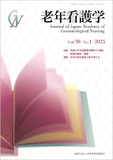Japanese
English
- 販売していません
- Abstract 文献概要
- 参考文献 Reference
抄録
本研究は,認知症の症状に気づいてから地域の支援体制が整うまでの期間に,認知症高齢者の家族介護者にとって支えとなったことを明らかにすることを目的に,家族介護者8人を対象に半構造化面接を実施した.分析の結果,【介護をすることへの準備ができていた】【認知症高齢者が心穏やかに過ごせていた】【認知症高齢者によい時間を過ごさせてあげたいという思いがあった】【認知症高齢者を家族介護者が自分で看たいと思った】【認知症を受け入れたり,気持ちが励まされたりするような言葉があった】【家族介護者の気持ちを受け止めてくれる人の存在があった】【介護をするなかで自分なりの方法や工夫,介護する意味を見つけられた】【家族の見守りや理解があった】【状況に応じて専門職が対応してくれた】の9つのカテゴリーが生成された.看護職は,家族介護者のもつ力を見極めて支援していくことや,家族介護者と認知症高齢者が共に安定した状態で過ごせるように双方への支援が重要であると考えられた.
In this study, semi-structured interviews were conducted with eight family caregivers of older adults with dementia to identify what supported them during the period between the onset of dementia symptoms until a community support system was in place. The analysis of interview data generated nine categories: being prepared for caregiving; the older adult with dementia maintaining peace of mind; desire to provide quality time for the older adult with dementia; caregiver's wish to personally care for the older adult with dementia; receiving words of acceptance or encouragement regarding dementia; having someone who could empathize with the caregiver's feelings; discovering personal methods, strategies, and meaning in caregiving; having family oversight and understanding; and professionals responding appropriately to the situation. The findings suggest the importance of nurses identifying and supporting the strengths of family caregivers and providing emotional support to both the family caregivers and the older adults with dementia, to help maintain a stable environment for both.
Copyright © 2025, Japan Academy of Gerontological Nursing All rights reserved.


